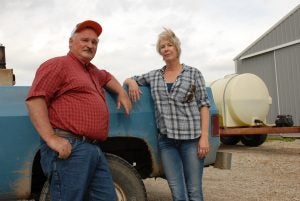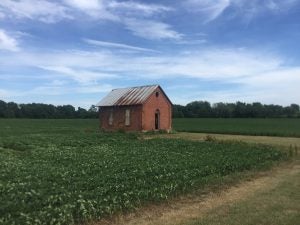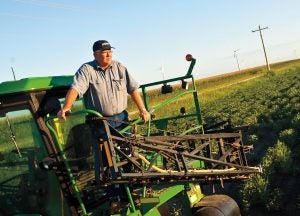 The corn and soybean fields that stretch for miles across the Midwest are quiet this time of year, mostly frozen surfaces waiting for the spring planting season.
The corn and soybean fields that stretch for miles across the Midwest are quiet this time of year, mostly frozen surfaces waiting for the spring planting season.
Although many farmers are not in the field dawn to dusk during the winter, they are still plenty busy. Between planning for the next season, taking care of animals and attending countless meetings, farmers are seldom idle even if their crop fields are.
But lucky for us, winter does afford more time to talk.
One friend from Iowa who works hard to use fertilizer efficiently to avoid runoff and optimize plant uptake of nutrients said he worries that food companies don’t always recognize the sustainability efforts of mainstream farmers. Too often, he said, it seems food companies look for simple labels like organic.
A soybean grower I know from Ohio who has invested a lot of time learning farming practices that will help restore nearby Lake Erie told me it is a constant struggle to balance making a living with repairing decades of agricultural nutrient runoff that have imperiled the health of the lake.
A third farmer said it makes all the difference in the world when food companies like Land O’Lakes are as dedicated to sustainability as they want growers to be. It gives farmers confidence to move forward, he said.
So much is on the shoulders of farmers: They feed us. They care for our land. They provide the raw ingredients for much of our economy. We could not exist without them. And we cannot create a food system that is both productive and sustainable without their full involvement.
But are we always listening to what they say?
[Tweet “Farmers’ voices are essential to figuring out sustainability. Let’s listen up.https://edf.org/7kN”]
A New Year’s resolution to listen
 Now, possibly more than ever, we need to be sure we have farmers at the table as we work toward agricultural sustainability. We need them to be part of the dialogue and part of the work of making it happen. This is true for supply chain sustainability efforts, policy discussions about conservation and discussions around data and technology.
Now, possibly more than ever, we need to be sure we have farmers at the table as we work toward agricultural sustainability. We need them to be part of the dialogue and part of the work of making it happen. This is true for supply chain sustainability efforts, policy discussions about conservation and discussions around data and technology.
In 2017, we have a whole new political dynamic. The recent election made it clear that we are not hearing all the voices we need to hear, especially from rural America. Those of us working on food and agriculture need to really ask ourselves: Are we creating the conditions to listen, hear and understand them?
Environmental Defense Fund spends a lot of time working with partners across the supply chain. We work directly with leading companies like Smithfield Foods, Land O’Lakes, and Walmart, and we participate in important cross-sector initiatives like Field to Market.
As the private sector takes much needed – and business-smart – steps to address consumer calls for sustainability and reduce supply risks for major commodities, let’s be sure the programs and policies are viable and valuable for farmers actually producing those commodities. It’s a shared responsibility across the supply chain, and part of that shared responsibility is asking the hard questions and doing the hard work of making sure each sector is playing its role.

Credit: Hannon Ayer
When the Iowa farmer practicing fertilizer optimization asked me, “What assurance can we give that food companies will trust sustainability programs for mainstream agriculture?” and not just turn to local, organic, non-GMO or other simple messages?” I had to respond that there are no promises.
The discussion that followed was valuable to both of us. It highlighted the anxiety many farmers feel as they take bold steps to be both mainstream and more sustainable with critical resources for water quality and climate. They want to know, will food companies support them? I shared my belief that, provided we can track anonymously and document environmental value, food companies will want this kind of sustainability.
This farmer and I agreed that if we do not work together to offer a scalable, mainstream version of sustainability, downstream buyers of corn, wheat and soybeans might feel they have no alternative to today’s labels or mandatory checklists.
Ag data’s need for farmers’ experience
 Needing farmers to be part of the dialogue is especially true when it comes to data. As more companies jump into the ag data and technology space, we need to work with farmers to be sure these tools are accessible and useful to them. We need innovations that help farmers improve their sustainability and strengthen their businesses. We need farmers at the table to be sure that collection, analysis and use of big and small data provides us with a way to track and quantify progress on sustainability while protecting farmer confidentiality and providing value back to them.
Needing farmers to be part of the dialogue is especially true when it comes to data. As more companies jump into the ag data and technology space, we need to work with farmers to be sure these tools are accessible and useful to them. We need innovations that help farmers improve their sustainability and strengthen their businesses. We need farmers at the table to be sure that collection, analysis and use of big and small data provides us with a way to track and quantify progress on sustainability while protecting farmer confidentiality and providing value back to them.
This all came home to me at a great event I had the privilege to attend this fall. Working with our partners at Land O’Lakes, we brought a group of leading growers and grower associations together to talk about Land O’ Lakes’ SUSTAIN program, which seeks to train ag advisors to bring sustainability practices directly to farmers, at scale. We discussed the program, collected opinions and had time to socialize, relax and share stories.
After the meeting, my friend and Indiana farmer Brent said, “After this weekend, I really have a conviction that this is a sustainable project (pun intended), because of Land O’Lakes’ large footprint and the dedication of their leadership. With those two factors, I am confident of successful implementation and long-term buy-in.”
My team members and I at EDF have always prioritized hearing from farmers, including creating a farmer advisory board to provide us with feedback on a regular basis. But this is not nearly enough. I need and want to dedicate even more time to listening to farmers, hearing their wisdom, and making sure they are not just at the table, but at the head of that table.
Related:
This Iowa farmer proves that profit and sustainability go hand in hand >>
Meet Brent Bible, state trooper turned farmer and mentor >>
Organic or conventional. Which production system can feed the world sustainably? >>










3 Comments
Amen. As a beef cattle rancher and environmentalist I have been dismayed by the lack of trust and understanding between my peers in both groups. Nobody wants to save the planet more than people in agriculture, and people in agriculture are the first victims of climate change. Keeping the soil healthy and sequestering carbon is a big part of reversing the damage from fossil fuels. Environmentalists must work with agriculture if we will have a chance at success. I am glad to see this outreach coming from the environmental side and I will do what I can from the agricultural side.
Joe, thank you so much for your kind words. You’re exactly right. Too often people view the environment and agriculture as polar opposites. In reality, they’re fundamentally intertwined, and I really appreciate hearing how you’re bringing the groups together. Working collaboratively is the only way to find stewardship solutions that are practical and scalable. I’d be interested in talking further if you’re interested.
What is not mentioned is the dismal market prices for rice and corn. We had to sell our corn for pig feed and my sister had to put her rice in a loan program. We own a small farming operation in Arkansas. The price of soybeans jumped up and we had to sell before the jump because of storage fees. Even though I am a Democrat and living in california neither political party has backed the farmers.monsanto doesn’t allow us to reseed and we pay a fortune in seeds.farm subsidies are low and trumps attitude toward China and Cuba which is our major exporters is lousy.we are in conservation programs and doing our best. Built reservoirs to trap rainwater.Global warming has affected the crops as well crop pests. I have never seen such total disrespect for the American farmer.